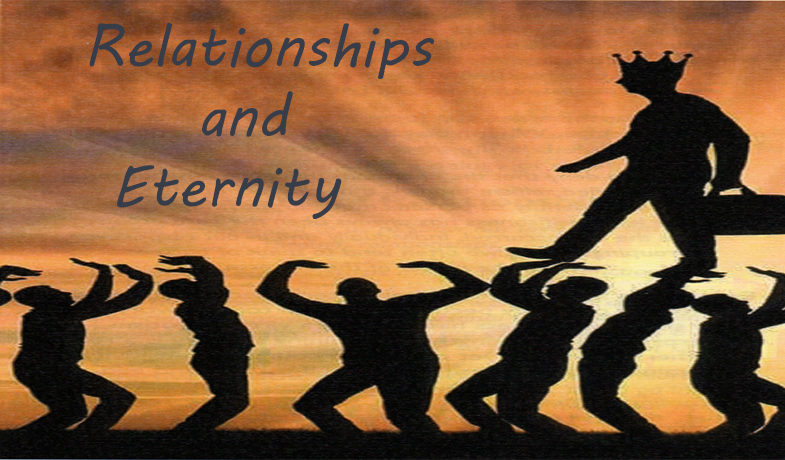Eternal Life & Relationships
Luke 10:25 And, behold, a certain lawyer stood up, and tempted him, saying, “Master, what shall I do to inherit eternal life?” Luke 16:20 And there was a certain beggar named Lazarus, which was laid at his gate, full of sores.
In both verses, the focus is on possessions, not relationships. When you take it all apart, the possession is really me. It is “I want to make sure I put me first.”
It is hard to deny that the enormous influence of what some have called selfism today is a by-product of the loss of our self identity as persons made in the image of God. At one level, selfishness has always been the core problem since the Fall occurred. Individually and in our respective groupings in life, we often tend to think of ourselves as at the center of the universe.
Even God’s significance is often determined by His relation to me or to my peculiar group. In today’s world self-centeredness has become a virtue; egotism is interpreted as a strength, and whining self-pity is a reason others must take yet one more course in sensitivity training, to not harm others’ self-esteem and ego.
According to Matthew and Luke, two of the New Testament gospels, the devil took Jesus to a high mountain and showed him ‘all the kingdoms of the world and their splendor.’ Jesus’ answer was unequivocal: ‘Away from me, Satan! For it is written: “Worship the Lord your God, and serve Him only.” (Matt. 4:8–10; cf. Luke 4:5–8).
The question has always been, “is it about Me or is it about you, Jesus? Is everything in life about me and what I want and think I need, or is it about You and what You want in Me?”What are my relationships to be about?
If the heart of sinfulness is self-centeredness, the heart of all biblical religion is God-centeredness. In our fallenness, we constrict all there is to our petty horizons. Most of us think of all relationships in terms of their impact on us; our daydreams circle around our life and circumstances; our goals and hopes invariably turn on our place in the universe.
The older virtues, largely derived from the Judeo-Christian heritage, which promoted self-denial and service to others as joined alike to love for others and to personal growth, have been drowned in a deluge of selfism.
The Value of Relationships
Jesus issues a call to us to show our love for Him through relationships.
Personal Relationships means not just functional.
Deeper Relationships means that we not stay at the level of superficiality—knowing a few personal things about people and only asking glibly how things are going. Galatians 6:2 Bear you one another’s burdens, and so fulfill the law of Christ.
Supportive Relationships are when we have a heart to lighten people’s load as we get to know them. If you go into a relationship mainly to use the other person to meet your needs, it will very likely collapse. (Acts 20:35)
Faith-Building Relationships All Christian relationships have this as their goal: to help each other stay satisfied in Jesus. There are people right now in our church that are in a crisis of faith. Will they keep on trusting in God’s future grace? Heb 3:12–13 Perseverance in faith is a relational project.
You cannot be close with everyone, but you can allow God to use you, and let Him help you love far beyond your most comfortable family and friends circle.
Relationships Here Affect Relationships There (Eternity)
Luke 16:20 In this parable Jesus makes it clear that the rich man was utterly self-indulgent. His focus was on his relationship with himself. There is no sense here of self-discipline, self-denial, or delayed gratification. It’s all enjoyment of all that is rich and sumptuous now.
It’s a pretty hideous picture. On the one side because of the physical suffering, on the other side because of the arrogance, indifference, and the hardness of heart.
The time came when the beggar died, and we find Abraham, who is the great ancestor of the entire Jewish race, in glory, in the new heaven and the new earth, and Lazarus is beside him at this banquet. And the rich man, in Hades, where he was in torment, looks up and somehow, far away, he sees Abraham with Lazarus by his side. He doesn’t even address Lazarus, he had disregarded him on earth and disregards him now. But he calls out to Father Abraham as if he might be playing some sort of racial and religion card: “You know I’m a true-blue Israelite myself, help!”
Abraham reminds the rich man, ‘remember that in your life, you received your good things while Lazarus received bad things.’ But now he is comforted here and you are in agony. The rich man said, ‘Abraham, send Lazarus to help me and my family.’ He was still concerned only with his own.
There is still no hint of brokenness or repentance. Merely familial concern for his own. Abraham replied, all that God has said on this matter is in the authoritative Scripture.
God is concerned about how we handle relationships in this life, and our choice to handle them God’s way will affect what happens to us in eternity.

